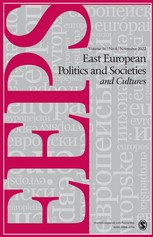Religion and National Identity in Central and Eastern European Countries: Persisting and Evolving Links
Religion and National Identity in Central and Eastern European Countries: Persisting and Evolving Links
Author(s): Simona Guglielmi, Arianna PiacentiniSubject(s): Politics, Nationalism Studies, History of Communism, Politics and Identity, Identity of Collectives
Published by: SAGE Publications Ltd
Keywords: religion; national identity; social identity; central and eastern Europe; formerly Communist countries; public opinion;
Summary/Abstract: The article contributes a better understanding of the mechanisms underpinning the intertwining of national and religious identity at the individual level in (some) former Communist and socialist European countries. It starts by retracing from a historical perspective the place religion occupied under the regimes, then paying attention to how, once politicized and ethnicized by the hand of a new class of ethnopolitical entrepreneurs, religion became “the hallmark of nationhood.” This excursus allows us to better contextualize both the theoretical argument and findings. The intertwining of national and religious identity is investigated from two main theoretical sources. The first is the debate within sociology and political science on different ideas of nationhood, while the second consists of socio-psychological models of intergroup relations. The empirical investigation is based on survey data from the European values study (EVS, 2017). A comparative approach is used that includes four countries having Catholic large majorities (Poland, Slovenia, Croatia, and Hungary) and, as a benchmark, Romania, having an Orthodox majority. To test the hypotheses, a structural equation model is specified. The causal model seeks to unravel to what extent different conceptions of nationhood (ethno-religious vs. civil), together with national attachment, influence the intergenerational transmission of religious values and distrust of people of another religion/nationality. The research results are in line with the current European trends pointing in the direction of a stronger overlap between the religious and the national in tailoring collective identities.
Journal: East European Politics and Societies
- Issue Year: 38/2024
- Issue No: 02
- Page Range: 455-485
- Page Count: 32
- Language: English
- Content File-PDF

